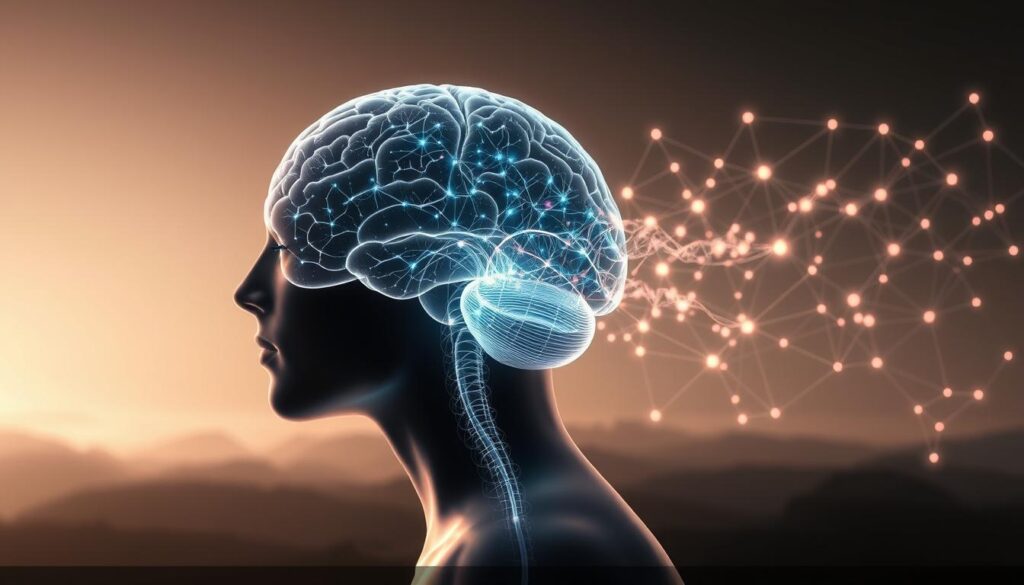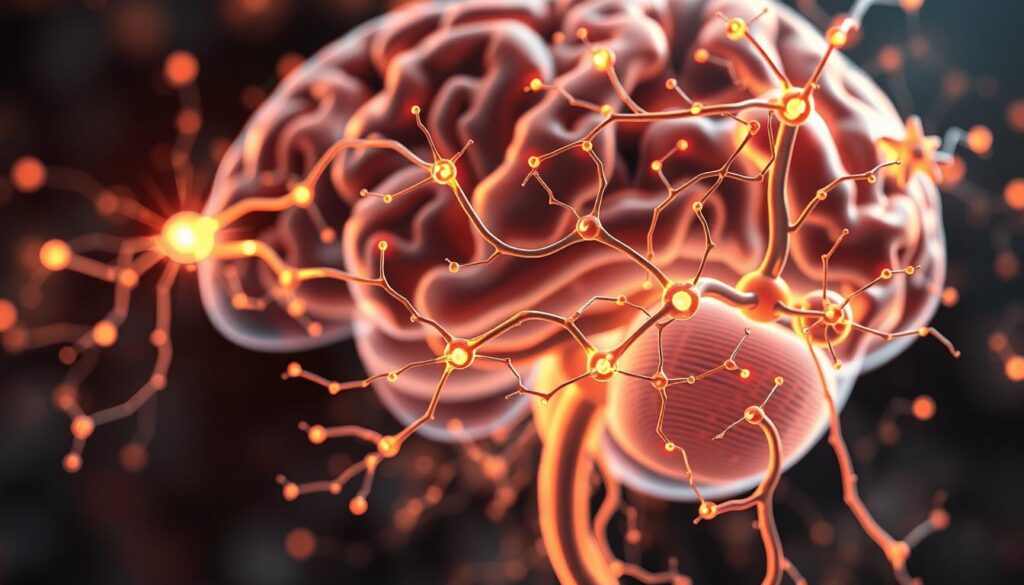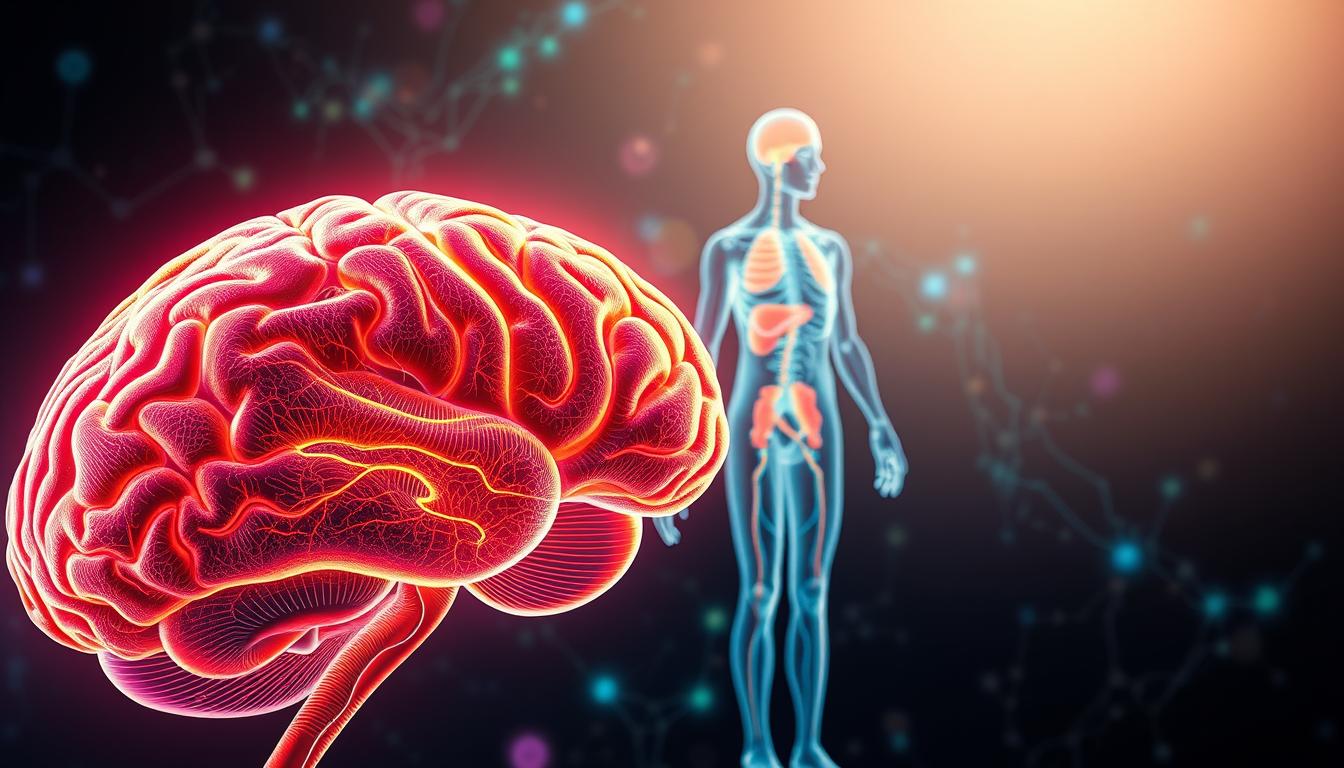Your brain is much more complex than we thought. New research shows how the brain and body are deeply connected. This could change how we see neurological health1.
The brain’s motor areas do more than just move us. They also connect to thinking and body functions1.
Scientists found a network called the Somato-Cognitive Action Network (SCAN). It shows how brain areas work together and grow in kids1. This network gets more complex as we get older, helping us think better1.
Research is shaking up old ideas about the brain. For nearly 90 years, we didn’t see the full picture of the mind-body link1. Now, we’re learning how brain areas for movement are linked to thinking and body functions like heart rate1.
Key Takeaways
- Brain regions have more complex connections than previously thought
- The Somato-Cognitive Action Network reveals advanced brain integration
- Movement areas are connected to cognitive and involuntary bodily functions
- Brain development is a dynamic, evolving process
- Traditional brain mapping is being reimagined by modern research
Understanding the Mind-Body Relationship in Modern Science
The connection between your brain and body is a fascinating area of study. Scientists are finding out how your mind affects your body. They are learning about a complex web of interactions that changes how we see health.
Recent discoveries have changed how we see the mind-body link. Now, we know that your thoughts can cause real changes in your body. This shows a deep connection between your mind and body2.
Historical Perspectives on Brain-Body Integration
For a long time, doctors thought the brain and body were separate. Early researchers found it hard to understand the links between them. But now, we see the brain and body as one, thanks to amazing research.
- Ancient medical traditions first proposed mind-body connections
- Psychological research gradually expanded understanding
- Technological advances enabled deeper neurological investigations
Recent Scientific Breakthroughs in Neurological Research
New research is showing us how amazing the brain is. Scientists found that stress can really affect your health. This has big implications for keeping people healthy2.
The Evolution of Brain-Body Studies
Today, we know that your mind and body are closely linked. Studies show that changing your lifestyle can make a big difference. Some changes can even cut health problems by up to 30%2.
The brain and body are not separate systems, but a unified, interconnected network of communication and response.
As we learn more, researchers keep finding new ways to connect mental and physical health. This could lead to new ways to take care of ourselves holistically.
The Hypothalamic-Pituitary-Adrenal (HPA) Axis: Your Body’s Stress Response System
Your body has a complex system called the HPA axis to handle stress3. It involves three main parts working together. They help your body react to tough situations4.
The HPA axis starts to form in the womb and gets more complex during puberty5. It has three key parts:
- The hypothalamus (about the size of a walnut)
- The pituitary gland (approximately the size of a pea)
- The adrenal glands
When you feel stressed, the HPA axis kicks in fast. It starts a chain of hormonal reactions3. Cortisol, known as the “stress hormone,” is released to help you cope3.
Interestingly, chronic stress can disrupt this delicate system. Long-term high cortisol levels can cause health problems. These include weakened immune function, higher infection risk, and possible metabolic and heart issues3.
The HPA axis has a smart negative feedback loop. When cortisol levels go up, it tells the hypothalamus and pituitary gland to make less hormone3. This keeps your body’s stress response in balance5.
Understanding your HPA axis can empower you to manage stress more effectively and protect your overall health.
How Your Mental Health Affects Physical Well-being
Your mental health is very important for your physical health. The mind and body are connected in a way that affects your health6. Knowing this helps you stay well in all ways.
Mental health affects your body in big ways. Conditions like depression can really change how your body works7. Studies show that mental health issues can cause physical problems:
Depression and Cardiovascular Health
Depression is more than just feeling sad. It can really hurt your heart health. Up to 20% of people with heart disease also have depression7. This shows how mental health affects your heart6.
Anxiety’s Physical Impact
Anxiety makes your body react in big ways. These symptoms can show up in many ways8:
- Heart palpitations
- Shortness of breath
- Muscle tension
- Digestive issues
Stress-Related Physical Symptoms
Long-term stress is bad for your body. High levels of stress hormones can harm your body in many ways6. This includes weakening your immune system and heart health6.
Your mental state isn’t separate from your physical health—they are deeply interconnected.
Understanding these connections helps you take care of your whole health. You can work on both your mind and body at the same time.
The Brain-Body Connection: Understanding Neurological Health’s Impact on You

Your neurological health is a complex web of interactions that deeply affects your overall well-being. The brain-body interaction is a dynamic system where mental and physical processes talk to each other9. It’s key to understanding this relationship for holistic health.
Researchers are finding out how your brain affects your body and vice versa. They’ve discovered some important connections:
- Sleep directly impacts cognitive function9
- Social connections play a vital role in brain health9
- Physical activity significantly influences neurological wellness9
New technologies are changing how we see neurological health. Research at places like the K. Lisa Yang Brain-Body Center at MIT is looking at how the brain and body systems interact10. These breakthroughs could lead to more personalized healthcare that considers the brain-body connection.
By understanding the deep connection between mental and physical health, you can improve your overall well-being. Your brain is not an isolated organ but a dynamic system deeply integrated with your entire body.
The future of healthcare lies in understanding the holistic nature of human health.
The Role of Inflammation in Mental Health
Your body’s immune system is key to your mental health. It shows a complex link between inflammation and how you feel. Scientists are finding out how inflammation affects your brain and mental health issues11.
Inflammatory processes can greatly affect mental health. More than 50% of global deaths from 1980 to 2017 were due to inflammatory diseases11. Clinical depression is especially linked to brain inflammation12.
Inflammatory Markers and Depression
Depression is closely tied to inflammatory responses in the body. Studies reveal some key insights:
- Clinical depression is associated with a 30% increase in brain inflammation12
- The risk of depression is high in disorders with inflammatory components11
- Severe depression affects approximately 4% of the population12
Immune System’s Influence on Brain Function
The immune system greatly affects mental health through various mechanisms:
- Psychosocial interventions can reduce harmful immune system functions by 18%11
- Cognitive-behavioral therapy (CBT) has shown promise in addressing immune system outcomes11
- The autonomic nervous system plays a critical role in stress response and immune function11
Understanding the link between neuroinflammation, mental health, and the immune system opens new treatment paths.
Hormones and Neural Communication Pathways

Your body’s neuroendocrine system is like a complex network. It connects hormones and neural pathways. This system is key to keeping you healthy and feeling good13.
The way your body talks to itself involves several steps:
- Hormone signal transmission
- Receptor activation in brain regions
- Neurotransmitter modulation
How well your hormones are balanced affects your brain. Changes in hormones like corticosteroids can change serotonin levels. This affects your mood, thinking, and feelings14.
“Hormones are the body’s chemical messengers, bridging the gap between neural systems and physiological responses.”
Stress hormones and brain circuits have a special connection. Long-term stress can change your brain’s structure. This includes neuronal remodeling and changes in how you think14.
Learning about these complex systems shows how your hormones and brain work together. Keeping hormone levels balanced helps your brain communicate better. This supports your overall brain health13.
The Gut-Brain Axis: Your Second Brain
Your digestive system is more than a food processor. It’s a complex network that affects your health and mood. The gut-brain axis shows how your gut microbiome influences your brain and mental state15.
The enteric nervous system has over 500 million neurons, rivaling your brain’s complexity. This “second brain” can work on its own, sending signals that affect your mental health15.
Microbiome’s Influence on Mental Wellness
Your gut microbiome does more than digest food. It produces neurotransmitters that affect your mood. Amazingly, about 90% of serotonin, the “happiness hormone,” is made in your gut15.
- Approximately 50% of individuals with irritable bowel syndrome experience anxiety or depression15
- Gut bacteria can influence brain function and behavior15
- Around 70% of your immune system resides in the gut15
Digestive Health and Cognitive Function
The link between your digestive system and brain is deep. Certain probiotics can reduce stress and improve mental health. For example, Bifidobacterium longum NCC3001 for six weeks helped those with digestive issues feel less anxious and depressed16.
| Gut Health Factor | Potential Mental Health Impact |
|---|---|
| Probiotics | Reduce anxiety and stress |
| Short-chain fatty acids | Support brain function |
| Fermented foods | Alter brain activity |
By understanding and caring for your gut-brain axis, you can improve your digestive and mental health17.
Exercise and Neuroplasticity: Moving for Mental Health
Your brain can change and adapt all your life, thanks to neuroplasticity. Regular exercise is key to keeping this brain function strong18. Older athletes show better thinking skills than those who don’t move much, proving exercise boosts brain power18.
Physical activity is great for your brain. It makes thinking clearer, especially with tasks that need planning and organization18. Experts say you should:
- Do moderate exercise for 150-300 minutes a week19
- Do vigorous activities for at least 75 minutes weekly19
- Do a mix of endurance and strength training19
Exercise helps your brain in many ways. It can make your brain bigger, especially in parts that help with thinking18. People who are more active have more brain matter and better memory18.
Adding exercise to your daily life does more than just keep you fit. It also helps your brain stay sharp as you age19.
Movement is medicine for the brain – every step counts towards better neurological health.
Begin with small steps, stay regular, and see how exercise changes your brain.
Lifestyle Factors Affecting Brain-Body Health
Your daily choices are key to keeping your brain healthy. Knowing how lifestyle affects your brain can guide your health decisions20.
Sleep is vital for brain health. The Centers for Disease Control and Prevention say you need at least 7 hours of sleep each night. This helps your brain work well and handle stress20.
- Manage blood sugar, cholesterol, and blood pressure to support heart and brain health20
- Practice stress reduction techniques
- Maintain a balanced nutrition plan
Nutrition is also important for brain health. Certain nutrients can greatly affect how well your brain works21. Omega-3 fatty acids, especially DHA in salmon, are good for brain cells21.
| Lifestyle Factor | Impact on Brain Health |
|---|---|
| Nutrition | Supports cognitive function and neural development |
| Exercise | Elevates BDNF levels crucial for brain health21 |
| Stress Management | Reduces negative impacts on overall health20 |
Regular exercise and mindfulness boost your brain’s ability to change and adapt. By focusing on lifestyle, you can keep your brain healthy for a long time2021.
The Future of Brain-Body Research and Treatment
Brain-body research is on the verge of a breakthrough. The K. Lisa Yang Brain-Body Center is leading the way with new technologies22. They aim to tackle neurological conditions with advanced molecular tools22.
Neurological disorders are a big challenge worldwide. But, researchers are working on precise treatments22. They hope to change how we treat these conditions for the better22.
New therapies are using advanced methods like precision epigenomic editing23. This method tries to fix problems caused by aging, injury, or disease. It targets specific genetic markers and pathways, offering hope for many conditions23.
These personalized treatments could lead to better results by matching treatments to each person’s genes24. It’s a big step towards more effective healthcare24.
The future of brain-body research will bring new diagnostic tools and monitoring methods24. Scientists are working on ways to track our body’s rhythms and genetic makeup. This will help create more detailed treatment plans24.
With 1 in 5 American adults dealing with mental health issues, these advancements are crucial23. They promise to make healthcare more effective and tailored to each person’s needs23.
FAQ
What exactly is the brain-body connection?
How does stress impact my overall health?
Can my gut health really affect my mental well-being?
How does exercise benefit brain health?
What role do hormones play in brain function?
Is inflammation connected to mental health?
How can I support my brain-body health through lifestyle choices?
What are the latest developments in brain-body research?
Source Links
- Mind-body connection is built into brain, study suggests | WashU Medicine – https://medicine.washu.edu/news/mind-body-connection-is-built-into-brain-study-suggests/
- The Mindful Movement Podcast and Community – https://redcircle.com/shows/the-mindful-movement-podcast-and-community
- What Is the Hypothalamic-Pituitary-Adrenal (HPA) Axis? – https://www.verywellhealth.com/hypothalamic-pituitary-adrenal-hpa-axis-5222557
- The role of the hypothalamic-pituitary-adrenal axis in neuroendocrine responses to stress – https://pmc.ncbi.nlm.nih.gov/articles/PMC3181830/
- Frontiers | The Hypothalamic-Pituitary-Adrenal Axis: Development, Programming Actions of Hormones, and Maternal-Fetal Interactions – https://www.frontiersin.org/journals/behavioral-neuroscience/articles/10.3389/fnbeh.2020.601939/full
- The Connection Between Mental Health and Physical Health – https://www.verywellmind.com/the-mental-and-physical-health-connection-7255857
- How Does Mental Health Affect Physical Health? – https://www.webmd.com/mental-health/how-does-mental-health-affect-physical-health
- How Does Mental Health Impact on Physical Health | Insights – https://uncovercounseling.com/blog/how-does-mental-health-impact-physical-health/
- Global Council on Brain Health Resource Library – https://www.aarp.org/health/brain-health/global-council-on-brain-health/resource-library/
- Neuralink’s Brain Chip: How It Works and What It Means | Capitol Technology University – https://www.captechu.edu/blog/neuralinks-brain-chip-how-it-works-and-what-it-means
- Mental health and immunity (Review) – https://pmc.ncbi.nlm.nih.gov/articles/PMC7604758/
- Severe depression linked with inflammation in the brain – https://www.medicalnewstoday.com/articles/288715
- Brain-Body Pathways Linking Psychological Stress and Physical Health – https://pmc.ncbi.nlm.nih.gov/articles/PMC4535428/
- Redefining neuroendocrinology: stress, sex and cognitive and emotional regulation – https://pmc.ncbi.nlm.nih.gov/articles/PMC4515381/
- What To Know About the Gut-Brain Connection – https://my.clevelandclinic.org/health/body/the-gut-brain-connection
- The Gut-Brain Connection: How it Works and The Role of Nutrition – https://www.healthline.com/nutrition/gut-brain-connection
- The Brain-Gut Connection – https://www.hopkinsmedicine.org/health/wellness-and-prevention/the-brain-gut-connection
- Physical activity and brain plasticity in late adulthood – https://pmc.ncbi.nlm.nih.gov/articles/PMC3622473/
- Exercise sustains the hallmarks of health – https://pmc.ncbi.nlm.nih.gov/articles/PMC9923435/
- What’s Good for Your Heart is Good for Your Brain – https://www.brownhealth.org/lifespan-living/whats-good-your-heart-good-your-brain
- Scientists learn how what you eat affects your brain – and your kids’ – https://www.uclahealth.org/news/release/scientists-learn-how-what-you-eat-affects-your-brain-and-your-kids
- What is brain health and why is it important? – https://www.bmj.com/content/371/bmj.m3683
- Brain Disorders: Causes, Symptoms, and Diagnosis – https://www.healthline.com/health/brain-disorders
- Brain–Body Interactions – Brain Health Across the Life Span – https://www.ncbi.nlm.nih.gov/books/NBK556443/




